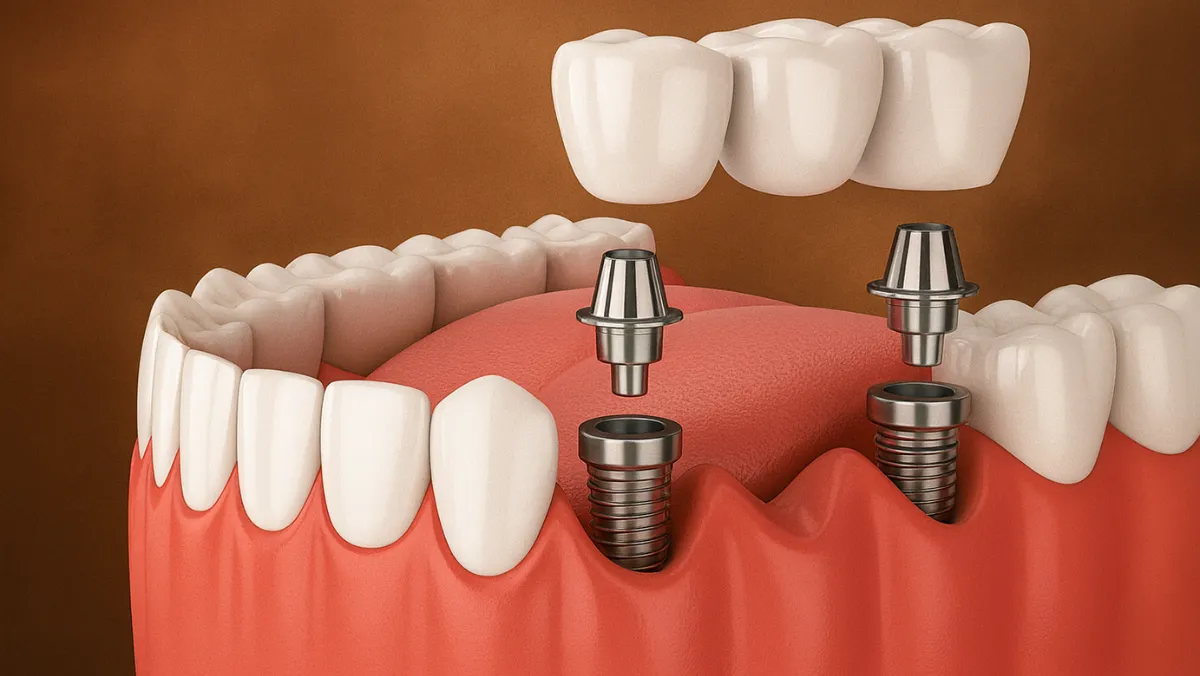Restore missing teeth with the Best Dental Implants in Chennai for durability, natural look, and comfort.

Safety Rate
Safety Rate
Comprehensive Dental Implants care with advanced monitoring and safety protocols
Dental implants are modern solutions to replace missing or damaged teeth, offering a permanent and durable alternative to traditional dentures or bridges. Unlike other dental restoration methods, implants are inserted directly into the jawbone, mimicking the natural structure of teeth. This procedure is vital for maintaining oral health, improving aesthetics, and restoring the functionality of your mouth. Dental implants have revolutionized dentistry, offering high success rates, long-lasting results, and significant improvements in quality of life for patients.
There are several types of dental implants, each designed to cater to different patient needs and anatomical conditions. The two most common types are endosteal and subperiosteal implants.
Each type is tailored to suit specific clinical needs, ensuring an optimal fit for each patient.
Dental implants provide a wide range of benefits that improve both appearance and function. Unlike dentures, implants are permanent, offering stability and durability. They help restore normal bite force, allowing you to eat, speak, and smile confidently without worrying about slippage. Additionally, implants stimulate the jawbone, preventing bone loss, which often occurs with missing teeth.
These advantages make dental implants a superior choice for tooth replacement.
Dental implants are ideal for individuals who have lost teeth due to injury, decay, or disease and are looking for a permanent solution. Candidates for implants should have sufficient jawbone density to support the implant. Those in good overall health with healthy gums are the best candidates for this procedure. Age is not a barrier, making it suitable for both younger and older individuals.
Implants offer a reliable solution for those seeking to restore both function and appearance.
While dental implants are effective for most people, certain conditions may prevent some individuals from being ideal candidates. People with insufficient jawbone density or those with certain health conditions like uncontrolled diabetes or heart disease may not be suitable for the procedure. Additionally, individuals who smoke heavily or have poor oral hygiene may experience complications.
Consultation with a dental specialist is crucial to determine whether dental implants are the right solution for you.
The dental implant procedure is typically performed in stages over a few months. First, the implant is surgically placed into the jawbone, where it will fuse with the bone over time through a process called osseointegration. After healing, a crown, bridge, or denture is placed on top of the implant to restore the tooth’s function and appearance.
The procedure is minimally invasive, and recovery times can vary based on individual health factors.
Dental implants have an impressive success rate, with studies showing that more than 95% of implants remain successful for many years. The success of the procedure depends on various factors, including the patient’s overall health, the condition of their jawbone, and the type of implant used. With proper care, dental implants can last a lifetime, making them one of the most reliable options for tooth replacement.
Their high success rate has made dental implants a trusted choice for restoring smiles and function.
The level of pain experienced during the dental implant procedure varies from patient to patient. Most people report mild discomfort rather than severe pain, which can be managed with local anesthesia during the surgery. After the procedure, some swelling and soreness are common but typically subside within a few days.
Your dentist will provide instructions for managing pain and promoting healing.
Like any surgical procedure, dental implants can present potential complications. The most common issues include infection, implant failure, or nerve damage. However, such complications are rare, and most patients experience smooth recovery. Following post-operative care instructions and regular dental check-ups can help reduce the risks.
In rare cases, further surgery may be needed, but overall, the risks are minimal.
Like any surgical procedure, dental implants can present potential complications. The most common issues include infection, implant failure, or nerve damage. However, such complications are rare, and most patients experience smooth recovery. Following post-operative care instructions and regular dental check-ups can help reduce the risks.
In rare cases, further surgery may be needed, but overall, the risks are minimal.
Dental implants are a revolutionary solution for people looking to restore their smile and improve their oral health. With a high success rate, long-lasting results, and the ability to improve both aesthetics and function, they are the gold standard for tooth replacement. While the procedure may require patience and careful aftercare, the benefits far outweigh the challenges. If you are missing teeth or looking for a lasting solution to improve your oral health, dental implants could be the right choice for you.
Dental implants can last for many years, with many lasting a lifetime when cared for properly. On average, the implant itself can remain intact for 25 years or more, while the crown or restoration on top may need replacement every 10 to 15 years. Proper oral hygiene, regular checkups, and avoiding hard or damaging foods can help prolong the lifespan of the implants.
The procedure is typically performed under local anesthesia, so patients generally experience little to no pain during the surgery itself. Post-surgery, discomfort is mild to moderate, with most patients reporting only swelling and soreness for a few days. Pain can usually be managed with prescribed or over-the-counter pain relievers, and most individuals feel better within a week.
The number of stitches required after a dental implant procedure depends on the complexity of the surgery and the number of implants being placed. Typically, patients can expect to have a few stitches to close the gum tissue around the implant. These stitches are usually dissolvable and do not need to be removed, though some cases may require a follow-up visit for stitch removal.
Our experienced anaesthesiologists are here to ensure your safety and comfort